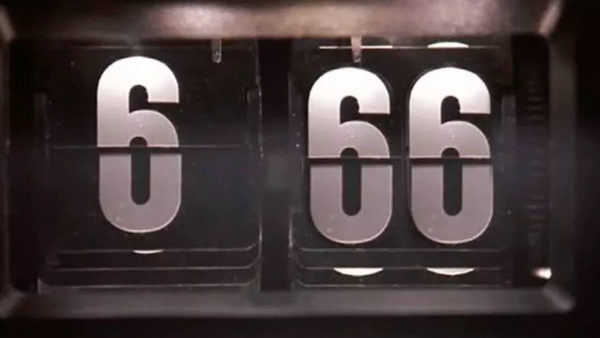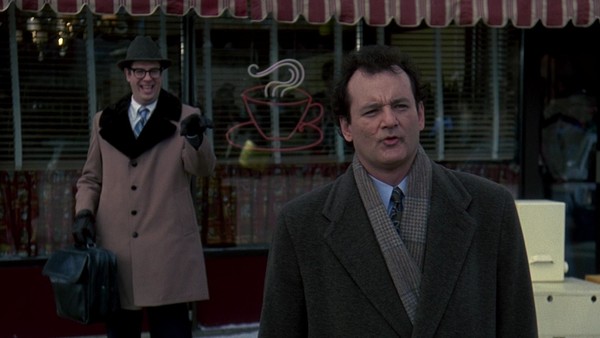Film Theory: Groundhog Day Is HELL And Ned Ryerson Is The Devil
Does Phil sell his soul for his freedom?

Somewhat inevitably, there's a pretty rich vein of discourse dedicated to spiritual ideology and Harold Ramis' wonderful Groundhog Day. As with anything so wrapped up in morality, pseudo-Christian values and reincarnation, it has become something of a touchstone for religious theorising. And Bill Murray's Phil Connors DOES say he's a god at one point...
There's been considerable talk about the idea that Phil is actually dead - having perished in the snowstorm that is then perpetually wrapped around Punxsutawney while his time-loop torment traps him. That's why he's unable to kill himself and why he's destined to live the same day over and over again: he's literally trapped in purgatory as his soul has been identified as not wholly bad but he cannot move on to Heaven until he proves his worthiness.
That school of thought basically suggests that all of the challenges that Phil overcomes by the end of the film are trials within purgatory that challenge him to make the most morally wholesome choices in the war for his soul. Either he's already fully dead at this point or he's dying, repeating his final day over and over in his head until he comes to the right resolution that helps him move on when he's ready to die properly.
But what if it's all a little darker than that? What if the Punxsutawney that Phil constructs in his mind isn't Purgatory but rather full-blooded, burn-your-briskets Hell?
Think about it: when we meet Phil, he's not a nice person. He's self-centred, arrogant, conceited and manipulative. He's not the kind of person who would be going to Heaven, in other words and it would take a SERIOUS attitude adjustment for him to even get to Purgatory. His morality is just that black and white and his idea of Hell is having to care about other people. To truly care, that is.
What worse a Hell could there be for someone so self-involved than being forced to help an entire town full of people? And worse than that, it's a Hell that promises him the ability to help and improve himself without ever letting him realise his moment of epiphany and move on. He can get kids WrestleMania tickets and fix people's backs, but he can't stop an old man from dying, no matter how hard he tries.
And on the surface, it might seem that that is because Phil initially uses the opportunity for self-improvement for the wrong reasons: he does it primarily to impress Rita in order to seduce her. Sure, there's probably an element of boredom that drives some of his behaviour (like learning to flick cards into a hat to expert level), but he's mostly focused on her as his goal until the very end when he is finally rewarded after a day of pure selflessness.
For most people, that would appear to be his defining arc and it's that that allows him to move on. But there might be something more to it. And to pick that apart, you have to consider two things: firstly, why Phil is trapped as he is in the first place and secondly what SPECIFICALLY gets him freed. It's simple enough to say that he's trapped because he's a bad person, but that wouldn't explain the supernatural element of it all and he's hardly the worst person in the world.
More likely is the suggestion that he's trapped in Punxsutawney as a punishment for something he does while he's there. Someone he interacts with who might have that sort of hellish power. How about the devil?
According to one theory that was originally posted on Reddit, he's there under the control of the devil, who we actually meet early on in Groundhog Day. You'd be forgiven for missing him too, because he doesn't come wearing red or bearing horns and a forked tail: instead he's a businessman in a suit selling life insurance.

That's right, Groundhog Day's Devil is, in fact, Ned Ryerson. Needle Nose Ned.
The theory suggests that Phil is trapped in Punxsutawney because he insults Ned and turns down his offer of a contract for life insurance. Or is that a contract for his soul? It's from the point of their first meeting that everything goes wrong for Phil. Literally, the first step he takes after their meeting is a "doozy" that sees him step into an icy puddle, and it's all downhill from there.
Curiously, Phil doesn't even recognise him, almost as if Ned doesn't actually know him and is operating under some pretence in order to get close to Phil. Almost like the Devil saw an opportunity to take a soul personally from someone he KNEW would be in Punxsutawney at that time and who he could probably have some fun with. Someone, mostly, who deserved to be tormented.
That would explain why it takes so long for Phil to "escape" Punxsutawney in the end. By the time he completes his "perfect day" there's no saying how many times he's tried to live purely selflessly (he does tell the kid who falls out of the tree he's saved him a LOT of times without a hint of gratitude), but you'd have to imagine it's a significant amount of time. There are lots of elements after all, but in the end only one matters.
It's not until Phil finally relents to Ned and signs away his soul to him that he's able to move on. That's the key to the ending, not saving anyone or any act of kindness. It's that transaction. Ned was always selling a contract that covered more than life insurance - he was bartering for Phil's soul, driving him to desperation through endless torment. That torment took two forms: first, making him miserable and then making him HAVE to be selfless - which was everything he hated up until his first meeting with Ned. By the end, he's lost sight of who he was and Ned/The Devil is able to absolutely fleece him out of extensive, unnecessary insurance.
Is this him selling his soul to the Devil for his freedom and everything he wants? After all, he wants to be loved by everyone, he wants to be famous, he wants to never suffer the torment of Punxsutawney ever again (which he achieves by learning to love it) and he gets the girl. Doesn't that all sound a little ideal?
So maybe the ending doesn't see Phil completely freed after all. Maybe him being freed from the loop is simply the end of his life as the Devil takes his soul and what we imagine is a happy ending is something far more profoundly sad. After all, just as George Bailey's "revelation" in It's A Wonderful Life isn't about escaping his hell, but rather embracing it, Phil's "happy ending" is simply to come to love everything that he hated and arguably abandoning everything that had made him successful. Doesn't that sound like Hell?
For more film theories like this, head to our new channel That Film Theory.